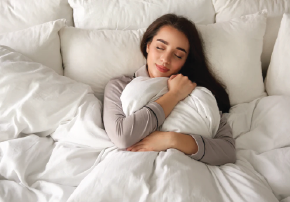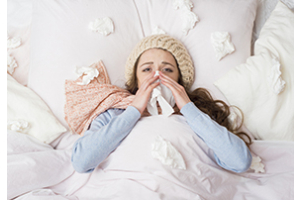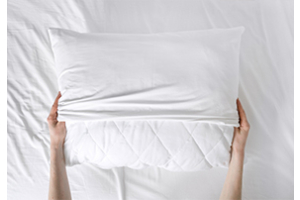How best to maintain your sleep routine in winter

How best to maintain your sleep routine in winter
Is winter sleep different?
Changes in season and temperature can affect your sleep routine. Winter months have less daylight. The drop in temperature can be mild to extreme. We might skip exercise because, you know, it’s a little rough out there. Diets turn to comfort food. We likely want to spend more time cocooning under the duvet.
Here are a few tips to keep your winter sleep routine consistent.
5 winter sleep tips
1. Keep to a healthy eating plan
Our eating plan has a direct influence on the quality of our sleep. What we eat, how much we consume, and especially when our digestive systems are at work, is important for a healthy sleep routine.
Comfort foods like hearty stews and pies, not to mention baked desserts, are all on the winter menu. And that’s okay. Just be sure to manage your portions. Preferably eat a lighter meal for dinner. And don’t be tempted to snack in bed. Bedtime binge snacking puts on the kilos. And your sleep is likely to be interrupted.
Of course – you guessed it – next to a healthy eating plan is to keep up a regular exercise routine. If it’s just too cold outside, devise an indoor workout that allows you to stick to a scheduled time.
2. Don't hibernate over weekends
After a challenging week, cocooning under a toasty duvet is just the best. Except it’s not. Beds are for sleep and should be psychologically associated with getting your mind and body ready for deep, restorative rest. A prolonged lie-in under the covers may put your sleep routine out of kilter. When you wake up, get up. At least move to the couch if you just want to enjoy a lazy day off.
3. Get up and get out
While daylight hours during winter are shorter, it is still just as important to expose yourself to natural light. Getting out while the sun’s up helps with melatonin, an important process that keeps your circadian rhythm, or body clock, attuned to your natural waking and sleeping hours. Getting proper exposure to sunlight during the day helps to prepare you for better sleep at night. And on that note, keep your bedroom lighting soft. Avoid the bright light of devices and TV screens that will trick your brain into thinking that it’s still daytime. Calm things down. Prepare yourself for a good night’s rest.
4. Use layers that breathe
If your bedroom feels like a fridge, you might want to pile on the blankets. In fact, that’s preferable to leaving a heater on all night. The trick is not to overdo it and to use fabrics that allow body heat and moisture to disperse. Summer or winter, your body has its own, self-regulating temperature gauge. Consider getting a padded winter duvet that is designed to ‘breathe’. For partners who have different body temperatures, wear breathable winter fabrics like thicker cotton, that allow your body temperature to self-regulate.
5. Cooler weather is actually better for sleep
Ever found it too hot to sleep in summer? Well, the same works for winter. You don’t want a stifling environment that overheats your body. You certainly don’t want to be cold, but you do want to be on the cooler side. As you go through your normal sleep cycles every night, your body temperature will naturally rise and fall. Leaving a window open just a crack can also help with keeping the airflow fresh and clean.
Sleeping for sinus relief
A stuffy nose, or blocked sinuses, is commonly called rhinitis. Symptoms can be either allergic or non-allergic. If you react easily to dust and mites, consider getting a protective mattress cover. Taking an antihistamine before bedtime can also help. If the air in your bedroom is too dry, this may likewise dry out the mucous membranes in your sinuses. In extreme cases it can lead to infection. Use a humidifier to gently condition the air for easier breathing.
If you’re experiencing acute rhinitis, prop yourself up with a few pillows to allow blockages to drain during the night and keep your nasal passages free. Using a saline nostril spray, or nasal strips, can also help to relieve your breathing. Studies have shown that sleep apnea, a condition where the body struggles to breathe naturally in sleep mode, is likely more pronounced in colder months. If you have sleep apnea, take extra care in winter to ensure your sleeping posture is properly supported.
Sound winter sleep, with Dial•a•Bed
Your quality of life depends on your quality of sleep. That’s why Dial•a•Bed takes South Africa’s sleep health so seriously. The more focused you are about your sleep, the more energy and drive you’ll enjoy during the day. South Africa’s largest branded bed retailer has every level of comfort and support for every sleep preference.
When last did you assess your mattress? If it was more than 8 years ago, you need to be browsing through www.dialabed.co.za to find your new, winter dream machine. Pop in for a comfort test at your nearest Dial∙a∙Bed store. There’s nothing like a sumptuous new mattress to keep the winter chills at bay. #SleepForLife.






